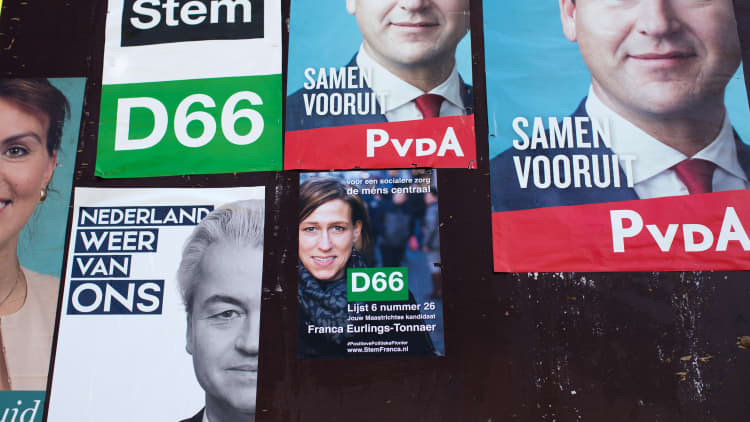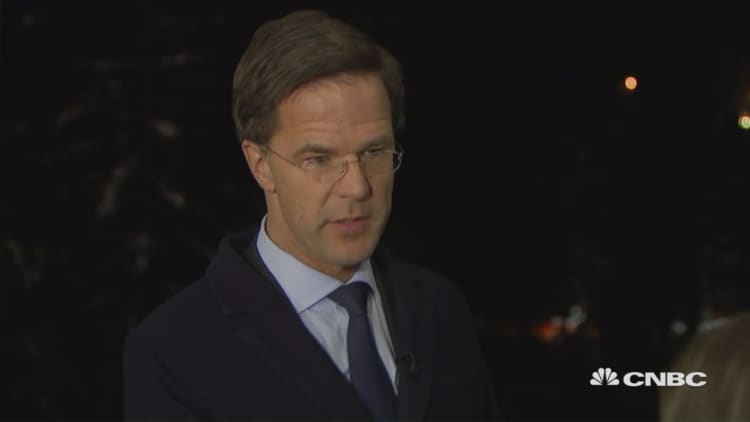
The Netherlands will head to the polls on March 15 to elect its next prime minister.
The vote is the first of several to take place across Europe this year and is seen as something of a bellwether for political sentiment on the continent.
Could Wednesday's vote see the Netherlands succumb to the populist attitudes that characterized the 2016 and U.S. election? Here's everything you need to know.
Main candidates
A total of 28 parties are vying for a chance to form a new Dutch government.
The Netherlands is a fractured political environment, based on proportional representation – or fair shares for all – which means that a coalition government is always necessary.
With 150 seats up for grabs in the Dutch parliament, and 76 required to form a majority, the incoming government is likely to be made of at least four to six different parties. Here are the front-runners among them.
VVD – People's Party for Freedom and Democracy (40 seats)
Led by current Dutch Prime Minister Mark Rutte -- the Liberal Party has held a majority in the Dutch government since 2012.
PvdA – Labour Party (35 seats)
The Labour Party is headed by Lodewijk Asscher, who is current Deputy Prime Minister but has faced criticism for his austerity measures.
SP – Socialist Party (15 seats)
The Socialist Party is led by Emile Roemer and focuses on policies including affordable healthcare.
CDA – Christian Democratic Appeal (13 seats)
Sybrand van Haersma Buma leads the Christian Democratic Appeal party and recently sought to follow PVV's Geert Wilders in building on EU disillusionment, voicing aims for significant reform of the union.
PVV – Party of Freedom (12 seats)
Euro-skeptic Geert Wilders heads up the populist Party of Freedom, which has gathered momentum among Dutch voters in this year's campaigning, capitalizing on growing nationalist and anti-Islamic sentiment.
D66 – Democrats 66 (12 seats)
Alexander Pechtold is vying to increase the Democrats' stance in government with policies including legalizing the production of weed, a subject of continued debate in the country.
GL – Greens (4 seats)
Thirty-year-old Jesse Klaver heads the Green Party, which has garnered appeal among younger votes.
What the polls say
The latest Dutch polling indicator Peilingwijzer shows the Liberals in the lead, set to win 23-27 seats.
Wilders, who was previously seen at the top of the polls, appears to have lost momentum in the final week. However, his Freedom party is poised to secure the second-largest number of seats, around 21-25.
With an estimated 18-20 seats, the Christian Democratic Appeal look set to come in third position, followed by the Democrats 66 (17-19), the Greens (15-17), the Socialist Party (14-16) and Labour (11-13).
What does this mean for the Netherlands?
Based on the current figures, at least five parties will need to team up together to reach the 76 seats required to form a coalition government.
While Rutte's Liberals ostensibly appear to secure a majority of votes, his success in government will be dependent on striking an allegiance with other parties. The same applies for Wilders' Freedom party.
Rutte has previously ruled out the possibility of forming a coalition with Wilders, who was previously a member of the Liberal party until 2004.
Other parties have been somewhat less definitive about their intentions, however, Wilders' anti-EU policies stand at odds with many of the other main players.
The most likely outcome currently looks to be a coalition between the four parties that cover the center spectrum – Liberals, Christian Democratic Appeal, Democrats 66 and Labour – but the probability is that they will have to strike an allegiance with a fifth and, given the shock election results of 2016, all bets are certainly not off.
Impact on bonds
Dutch 10 year bonds have been steadily recovering over recent months, having suffered a fall at the start of the year. However, the past month has continued to be volatile and investors will be watching closely to see the impact of the election on returns.
Voting day
Dutch voters will go to the polls on Wednesday March 15 and have until 9pm to vote for their preferred leader.
The results
Results will be counted and announced overnight. It is anticipated that there will be a clear indication of the winner by 5am or 6am local time.
However, it can take days, weeks or even months for Dutch parties to agree on a coalition.
What does this mean for Europe?
While the final coalition decision will be important for Europe and its continued EU-relations, the outcome of the leadership race will also have particular significance for France and Germany, which are also both holding general elections this year.
Should Wilders gain a stronghold among voters, the rest of Europe is likely to face an uneasy wait to see how this populist sentiment translates across neighboring countries.



